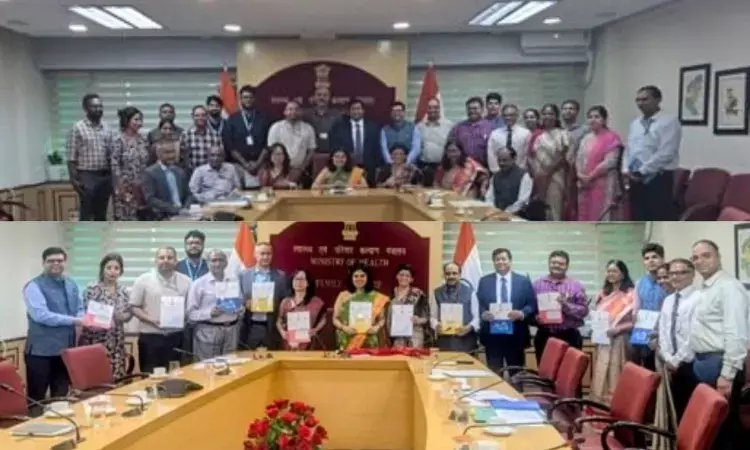- Home
- Medical news & Guidelines
- Anesthesiology
- Cardiology and CTVS
- Critical Care
- Dentistry
- Dermatology
- Diabetes and Endocrinology
- ENT
- Gastroenterology
- Medicine
- Nephrology
- Neurology
- Obstretics-Gynaecology
- Oncology
- Ophthalmology
- Orthopaedics
- Pediatrics-Neonatology
- Psychiatry
- Pulmonology
- Radiology
- Surgery
- Urology
- Laboratory Medicine
- Diet
- Nursing
- Paramedical
- Physiotherapy
- Health news
- Fact Check
- Bone Health Fact Check
- Brain Health Fact Check
- Cancer Related Fact Check
- Child Care Fact Check
- Dental and oral health fact check
- Diabetes and metabolic health fact check
- Diet and Nutrition Fact Check
- Eye and ENT Care Fact Check
- Fitness fact check
- Gut health fact check
- Heart health fact check
- Kidney health fact check
- Medical education fact check
- Men's health fact check
- Respiratory fact check
- Skin and hair care fact check
- Vaccine and Immunization fact check
- Women's health fact check
- AYUSH
- State News
- Andaman and Nicobar Islands
- Andhra Pradesh
- Arunachal Pradesh
- Assam
- Bihar
- Chandigarh
- Chattisgarh
- Dadra and Nagar Haveli
- Daman and Diu
- Delhi
- Goa
- Gujarat
- Haryana
- Himachal Pradesh
- Jammu & Kashmir
- Jharkhand
- Karnataka
- Kerala
- Ladakh
- Lakshadweep
- Madhya Pradesh
- Maharashtra
- Manipur
- Meghalaya
- Mizoram
- Nagaland
- Odisha
- Puducherry
- Punjab
- Rajasthan
- Sikkim
- Tamil Nadu
- Telangana
- Tripura
- Uttar Pradesh
- Uttrakhand
- West Bengal
- Medical Education
- Industry
Centre launches training modules on managing chemical emergencies

New Delhi: Chemical emergencies pose a significant and evolving threat to public health, environmental safety, and societal stability, underscoring the need for strengthened national preparedness and response mechanisms.
In the present fast-growing Industrial economy, updating and keeping oneself prepared for any such emergencies is of paramount importance.
As a step towards enhanced preparedness, the Secretary of Health and Family Welfare, along with Key Senior officials from various line ministries, national agencies, experts from the private sector, industry and academia, released the modules on Public Health Management of Chemical Emergencies at Nirman Bhawan, New Delhi.
Three specialized training modules have been developed by the National Centre for Disease Control (NCDC), Ministry of Health and Family Welfare (MoHFW), Government of India, on the Public Health Management of Chemical Emergencies in collaboration with NDMA (National Disaster Management Authority) and with technical support from the World Health Organization (WHO India), the PIB stated.
The three modules include:
• Module 1: Preparedness, Surveillance, and Response for Public Health Management of Chemical Emergencies.
• Module 2: Pre-Hospital Management of Chemical Emergencies.
• Module 3: Medical Management of Chemical Emergencies
These modules aim to equip public health professionals, healthcare workers, emergency responders, and policymakers with the necessary knowledge, skills, and operational tools for timely and effective management of chemical incidents. Strengthening chemical emergency management also supports core capacities under the International Health Regulations (IHR 2005), contributing to both national and global health security.
The launch event brought together officials from the Ministry of Health and Family Welfare, NDMA, Central government ministries, Central institutions, Academia, the WHO Country Office for India, and other key partners to reaffirm the commitment towards building a “Self-reliant Resilient Nation”.
Also Read:Health Sector Budget Allocation as Percentage of GDP Declining: Parliamentary Panel
Kajal Rajput joined Medical Dialogues as an Correspondent for the Latest Health News Section in 2019. She holds a Bachelor's degree in Arts from University of Delhi. She manly covers all the updates in health news, hospitals, doctors news, government policies and Health Ministry. She can be contacted at editorial@medicaldialogues.in Contact no. 011-43720751


